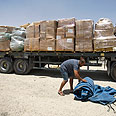
Aid at Kerem Shalom crossing
Photo: AP
The UN said Friday that groups seeking to deliver aid to Gaza should send it by land, after Israel said it would prevent two ships seeking to break a blockade of the Palestinian enclave.
"There are established routes for supplies to enter by land. That is the way aid should be delivered to the people of Gaza," United Nations spokesman Martin Nesirky told a press briefing.
Commando Raid
Official in Jerusalem says Human Right Council's decision to look into May 31 raid on Gaza-bound Turkish ship shows body 'obsessed with Israel.' Kadima MK: Investigate Shalit's captivity
"Our stated preference has been and remains that aid should be delivered by established routes, particularly at a sensitive time in indirect proximity (peace) talks between Palestinians and Israelis," he added.
He made the comments after Israel's UN Ambassador Gabriela Shalev wrote to UN chief Ban Ki-moon to warn that her country "reserves its right under international law to prevent" the two ships from Lebanon, identified as Junia and Julia, from accessing the Hamas-ruled Palestinian territory.
"The stated intention of these vessels is to violate the existing naval blockade of Gaza," Shalev wrote. "It cannot be ruled out that these vessels carry weapons or individuals with provocative and confrontational intentions."
The Israeli envoy pointed out that "all goods that are not weapons or materiel for war-like purposes are now entering the Gaza Strip through appropriate mechanisms that ensure their delivery as well as their civilian nature."
Her letter was Israel's latest warning against any effort to circumvent its blockade of Gaza despite international pressure in the wake of a May 31 Israeli commando raid that killed nine Turkish activists aboard a flotilla of aid ships on a blockade-busting bid.
Israel imposed the blockade in June 2006 after its soldier, Gilad Shalit, was captured by Gaza militants and tightened it a year later when Hamas seized power in the coastal strip.
In the wake of the May 31 incident, Israel has significantly eased the blockade, barring only arms and goods that could be used to create weapons or build fortifications, but it has maintained a naval blockade of the Strip.
"There has been progress in increasing the amount of aid, but it's far from enough and we continue to call for that," Nesirky said. "We repeatedly said it is vital there should be unfettered access for people and supplies."















